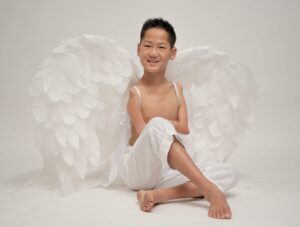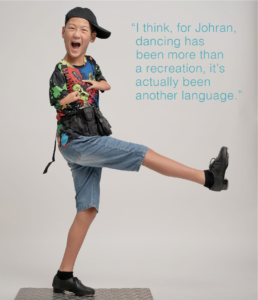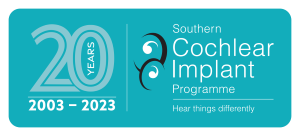Dance is Johran Dillinger’s love and he’s an accomplished competitive dancer after six years of classes.
“I love it and I enjoy it. I do ballet, jazz, and tap and contemporary dance and I used to do hip hop. My favourite type of dancing is jazz,” says 12-year old Johran, who lives in Invercargill.
In February he won the title of Junior National Champion Boys at the New Zealand Boys Dancing Convention in Christchurch. He travels a lot for competitions.

Johran was born deaf and with no arms in China. He was adopted and moved to the United States, before coming to New Zealand and being in foster care for the last six years with school teacher Richelle Waldron.
Johran is a vivacious child with loads of personality. He’s a keen soccer player in the winter, does flips and tricks on the trampoline, and learns the drums, which he plays with his feet. Johran likes school, particularly hard technology or wood working, sewing, art and music. He’s in Year 7 at James Hargest College and spends one day a week at a special school unit for deaf children called The Hub.
Richelle first met Johran when he was living in a foster care family home. “I was unable to have children, so it was just such a blessing to welcome three children into my home and into my heart and fortunately, the position with me has become permanent,” she says. Johran has four siblings with varying physical challenges. Two girls live with Johran and Richelle, while Richelle’s sister Alana Lang is also a foster mother to Johran’s brother and sister. Johran had a cochlear implant in the US when he was four years old and another one a few years ago in New Zealand. Johran’s auditory nerve was unable to convey the message from the second cochlear implant, so he can’t hear from it. He uses one cochlear implant successfully. He first watched his sisters dancing and indicated to Richelle that he would like to dance, too.
While Johran had no words or language at that time, it was clear that he wanted to dance. “He had so many issues with his balance I just didn’t see it is a possibility at that time for him, but he had other ideas about that,” says Richelle, who teaches tap dancing. Johran was prone to overbalancing and ending up in hospital with concussion. Since starting to dance when he was six, his balance has improved and Johran has not had a bad fall in several years, which Richelle attributes to the core strength and general body awareness he has developed through dancing. “He is beautiful at it and it has been quite therapeutic for his life,” she says.
“I think, for Johran, dancing has been more than a recreation, it’s actually been another language.
“Johran is very rhythmical. We always say dance is an expressive art form, but for him it has come to the fore by giving him a tangible way to express himself. “When he’s dancing he doesn’t hear the music in its entirety due to his weak auditory nerve, and with tap dancing he not only doesn’t hear the music, but also doesn’t hear the intricacies of his feet, so he is incredible.” To support Johran, Richelle sits in the audience and signs the beat and some elements of musicality to him.
“He’s done some really great things with his dance,” she says.
In his Dance New Zealand Made exams a few years ago Johran was awarded the highest grade for his level in the country. “I just think in terms of the extra challenges that he has, he’s just quite an exceptional human being. He’s got such a beautiful outlook and he’s a great kid. Johran has learned New Zealand Sign Language since he was six. It has been difficult as he does not have 10 fingers or two arms. He is very good at receptive signing and Richelle understands 99% of what he communicates.
Johran’s sign language interpreter Vanessa Underwood attends school with him, too, and helped with the interview for this story.
The family dogs Willow and Georgie are special to him. When Johran was initially non-verbal, it was lovely for him to have the special bond with the dogs, Richelle says.
Photo credit: Jasyon O’Kane
